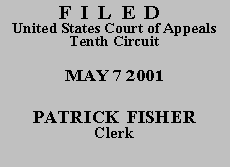

| FARMLAND INDUSTRIES, INC.,
a Kansas Corporation,
Plaintiff-Appellee, v. WILSON GAS AND OIL, INC., an Oklahoma corporation; WILLIAM D. WILSON, an individual; SHARON WILSON, an individual, Defendants-Appellants. |
|
Farmland Industries Inc. brought suit against Wilson Oil and Gas, Inc. for money allegedly owed under a credit agreement between the two companies. Farmland's suit also sought recovery on a personal guaranty signed by William and Sharon Wilson, principal officers and shareholders of Wilson Gas, guaranteeing all debts and obligations incurred by their corporation to Farmland.
Subject matter jurisdiction in the district court was based on diversity of citizenship. See 28 U.S.C. § 1332(a)(1), (c)(1). After the parties assented to final disposition by the magistrate court, the magistrate judge granted summary judgment in favor of Farmland. Wilson Gas and the Wilsons individually now appeal that judgment. This court has subject matter jurisdiction pursuant to 28 U.S.C. § 1291.
The parties are familiar with the facts so we need not recite them here. "We review the district court's grant . . . of summary judgment de novo, applying the same legal standard used by the district court pursuant to Fed. R. Civ. P. 56(c)." Kaul v. Stephan, 83 F.3d 1208, 1212 (10th Cir. 1996) (quotations omitted).
After reviewing the decision below, the parties' briefs, as well as the record, we affirm the lower court's judgment. We reach this conclusion for substantially the reasons stated in the magistrate judge's order of June 30, 1999.
We note that the magistrate judge relied largely on Oklahoma law to resolve this diversity case, despite what appears to be a clear choice of law provision in the parties' relevant contractual agreements. Both the credit agreement between Wilson Gas and Farmland and the personal guaranty signed by William and Sharon Wilson state that Missouri law shall govern any dispute between the parties.
It appears that neither party brought these provisions to the magistrate judge's attention. Indeed, in their briefs below they both largely relied on Oklahoma law. On appeal, and in apparent recognition of the choice of law stipulation, Wilson Gas and the Wilsons now cite and rely on Missouri law throughout their briefs. In contrast, despite having drafted the two documents containing the choice of law provision, Farmland continues to rely on Oklahoma law and makes no effort to explain why Missouri law does not control. The apparent confusion about the governing law has no effect on our disposition, however. In our review of the magistrate judge's decision, we reach the same conclusion regardless of whether Oklahoma or Missouri law applies.
Farmland's "motion to dismiss" for lack of jurisdiction is DENIED. The judgment of the United States District Court for the Eastern District of Oklahoma is AFFIRMED.
Entered for the Court
Circuit Judge
*. This order and judgment is not binding precedent, except under the doctrines of law of the case, res judicata, and collateral estoppel. The court generally disfavors the citation of orders and judgments; nevertheless, an order and judgment may be cited under the terms and conditions of 10th Cir. R. 36.3.